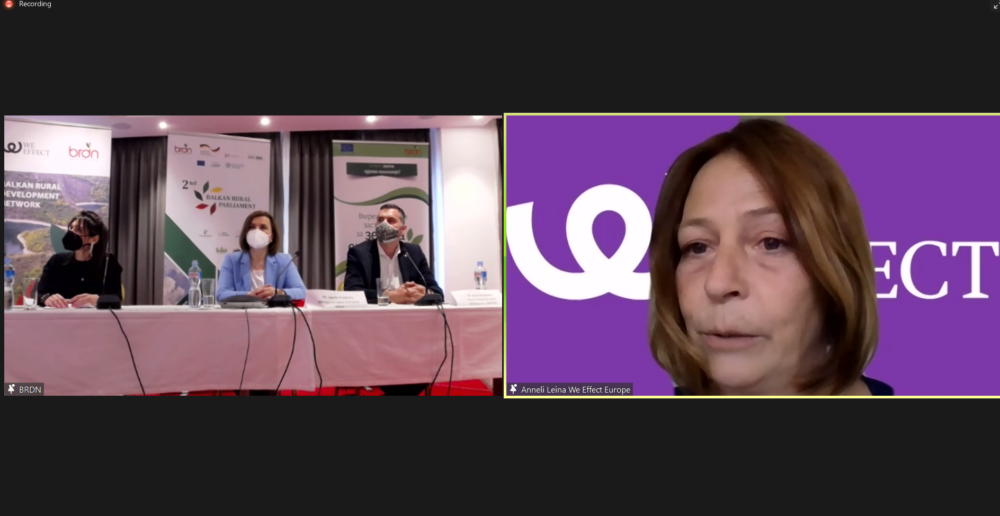Gender equality must be considered when policies are made
Date
June 16, 2021
Regional Director Anneli Leina (right) speaking online at the Forum along with Jagoda Shahpaska, Minister for Labour and Social Policy of North Macedonia and Goce Georgievski, Head of the Sector for Rural Development at the Ministry of Agriculture, Forestry and Water Economy of North Macedonia (left).
“Gender equality must be taken into consideration when decisions are made, resources are allocated, and policies and legal frameworks are created and implemented. At We Effect we try to be a driver in moving gender equality to the top of the regional rural development agenda. With our partner organisations in the region, we are committed to cooperate for action and change,” said Anneli Leina, Regional Director of We Effect Europe at the Regional Rural Development Policy Forum held in Ohrid, North Macedonia, on 14 of June.
This event, financially supported by We Effect and organized by our partner, the Balkan Rural Development Network (BRDN), brought together various stakeholders from the rural areas of Western Balkans as well as important actors of agricultural and rural development to discuss the challenges and actions they will take to improve the well-being of the rural people.
“As a government, we are committed to building a society with equal opportunities for women and men. Our goal is – one society for all! In the realization of this concept, women living in the rural areas have an important role because they are especially facing numerous challenges such as unemployment, deprivation of property, lack of access to educational, health, social services etc. For example, up to 63% of the rural women in North Macedonia are not active on the labour market due to family obligations and very few of them are managing farms,” said Jagoda Shahpaska, Minister for Labour and Social Policy of North Macedonia.
Petar Gjorgievski, the President of BRDN emphasized that “the people from the rural areas need to come together to work on their common needs. On the other hand, the government should bring its institutions closer to the rural population and use policy making as a tool for development, without unnecessary bureaucratic obstacles. I would like to emphasize once again the importance of CSOs as a mediator in this process, without whose participation this would not be possible.”
Apart from the Minister for Labour and Social Policy of North Macedonia, among the attendees of this Forum, some physically present and some via the Zoom platform, were also Goce Georgievski, Head of the Sector for Rural Development at the Ministry of Agriculture, Forestry and Water Economy of North Macedonia, other members of the establishment and broad spectrum of representatives of the development sector from seven Western Balkans countries: Albania, Bosnia, Croatia, Kosovo, Montenegro, North Macedonia and Serbia.
The discussions revolved around the topics of gender equality and rural women empowerment, social entrepreneurship as a model of rural community development and rural youth inclusion in the processes or rural development.
The Regional Rural Development Policy Forum was followed by the Balkan Rural Parliament taking place at the same venue on 15 and 16 of June.